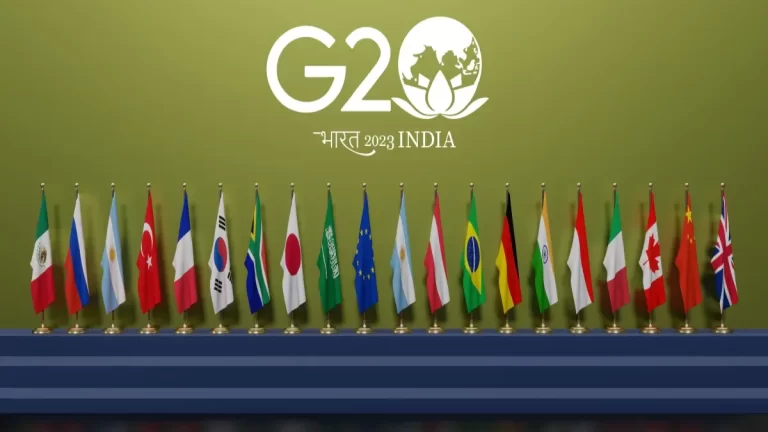The Group of Twenty (G20)

The Group of Twenty, commonly referred to as the G20, is an international forum comprised of 19 individual countries and the European Union. Established in 1999, this group plays a pivotal role in shaping global economic policies and fostering international cooperation. G20 MEMBERS The Group of Twenty (G20) comprises 19 countries (Argentina, Australia, Brazil, Canada, […]
The Group of Twenty, commonly referred to as the G20, is an international forum comprised of 19 individual countries and the European Union. Established in 1999, this group plays a pivotal role in shaping global economic policies and fostering international cooperation.
G20 MEMBERS
The Group of Twenty (G20) comprises 19 countries (Argentina, Australia, Brazil, Canada, China, France, Germany, India, Indonesia, Italy, Japan, Republic of Korea, Mexico, Russia, Saudi Arabia, South Africa, Türkiye, United Kingdom and United States) and the European Union. The G20 members represent around 85% of the global GDP, over 75% of the global trade, and about two-thirds of the world population.
G20 Works:
The G20 operates as a platform for dialogue and cooperation among its member nations, addressing pressing global issues, particularly those related to economic stability, sustainable development, and international finance. The key areas of focus and functions of the G20 include:
- Economic Coordination: One of the primary roles of the G20 is to foster economic stability and growth by facilitating discussions and cooperation on issues like monetary policy, trade, fiscal policy, and employment.
- Financial Regulation: In the aftermath of the 2008 financial crisis, the G20 played a crucial role in implementing financial regulatory reforms to prevent a recurrence of such crises. It oversees efforts to strengthen global financial systems.
- Sustainable Development: The G20 addresses challenges related to sustainable development, including climate change, energy security, and sustainable infrastructure. This includes discussions on the United Nations Sustainable Development Goals (SDGs).
- Trade and Investment: Member countries work together to promote open and fair international trade and investment practices, with an emphasis on reducing protectionism.
- Global Health: The G20 has also been active in addressing global health challenges, such as the response to pandemics and access to vaccines, as demonstrated during the COVID-19 pandemic.
India’s G20 Priorities:
As a G20 member, India has its own set of priorities and interests that it aims to address within the forum. Some of India’s key G20 priorities include:
- Economic Growth: India seeks to promote inclusive and sustainable economic growth. This involves advocating for policies that support job creation, reduce poverty, and enhance economic resilience.
- Climate Change: Given India’s vulnerability to climate change, it emphasizes the importance of a balanced approach that considers the developmental needs of emerging economies while addressing climate-related concerns. India aims to promote renewable energy and sustainable practices.
- Digital Economy: India recognizes the potential of the digital economy and strives to foster digital inclusion, data security, and e-commerce within the G20 framework.
- Health Security: India places importance on global health security, especially in light of the COVID-19 pandemic. It advocates for better pandemic preparedness and affordable access to vaccines and medical supplies.
- Financial Inclusion: India is committed to promoting financial inclusion and ensuring that the benefits of financial services reach underserved populations.
- Reform of Global Governance: India seeks a more inclusive and equitable global governance structure, particularly in international financial institutions like the International Monetary Fund (IMF) and the World Bank.





प्रातिक्रिया दे